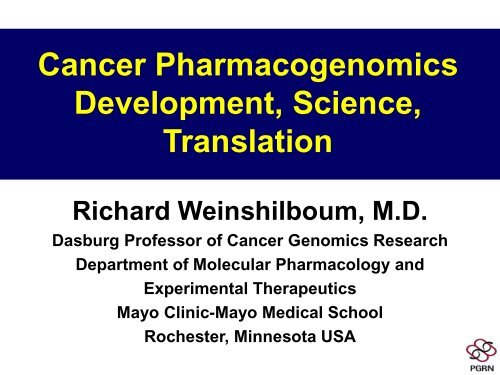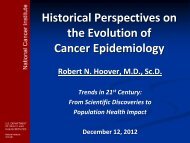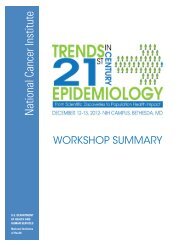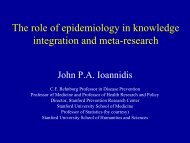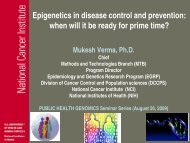Cancer Pharmacogenomics Development, Science, Translation
Cancer Pharmacogenomics Development, Science, Translation
Cancer Pharmacogenomics Development, Science, Translation
You also want an ePaper? Increase the reach of your titles
YUMPU automatically turns print PDFs into web optimized ePapers that Google loves.
<strong>Cancer</strong> <strong>Pharmacogenomics</strong><br />
<strong>Development</strong>, <strong>Science</strong>,<br />
<strong>Translation</strong><br />
Richard Weinshilboum, M.D.<br />
Dasburg Professor of <strong>Cancer</strong> Genomics Research<br />
Department of Molecular Pharmacology and<br />
Experimental Therapeutics<br />
Mayo Clinic-Mayo Medical School<br />
Rochester, Minnesota USA
<strong>Cancer</strong> <strong>Pharmacogenomics</strong><br />
• Introduction<br />
• Present<br />
• Promise<br />
• Conclusions
Pharmacogenetics-<strong>Pharmacogenomics</strong><br />
Critical component of<br />
“personalized” or “individualized”<br />
medicine
Pharmacogenetics-<strong>Pharmacogenomics</strong><br />
Clinical Goals<br />
• Avoid adverse drug reactions<br />
• Maximize drug efficacy<br />
• Select responsive patients
Pharmacogenetics-<strong>Pharmacogenomics</strong><br />
Scientific Goals<br />
• Link variation in genotype to variation<br />
in phenotype<br />
• Determine mechanisms responsible for<br />
that link<br />
• Translate the link into enhanced<br />
understanding, treatment and<br />
prevention of disease
<strong>Cancer</strong> <strong>Pharmacogenomics</strong><br />
• Introduction<br />
• Present<br />
• Promise<br />
• Conclusions
Pharmacogenetics-<strong>Pharmacogenomics</strong><br />
FDA Hearings<br />
Pharmacogenetics and Drug Labeling<br />
• Thiopurines – TPMT*<br />
• Irinotecan – UGT1A1*<br />
• Warfarin – CYP2C9 and VKORC1*<br />
• Tamoxifen – CYP2D6*<br />
*germline polymorphisms
Childhood ALL Survival<br />
St. Jude Experience<br />
Pui and Evans, NEJM. 2006;354:166-78. Copyright © 2006 Massachusetts Medical Society.<br />
All rights reserved.
• Low TPMT<br />
TPMT<br />
Genetic Polymorphism<br />
Clinical Consequences<br />
– Increased thiopurine toxicity<br />
– Increased risk for secondary neoplasm<br />
• High TPMT<br />
– Decreased therapeutic effect
Selected Human TPMT Alleles<br />
TPMT*1<br />
(wild type)<br />
TPMT*3A<br />
VNTR<br />
1 2 3 4 5 6 7 8 9 10<br />
TPMT*3B<br />
TPMT*3C<br />
VNTR<br />
VNTR<br />
G460A<br />
Ala154Thr<br />
G460A<br />
Ala154Thr<br />
A719G<br />
Tyr240Cys<br />
VNTR<br />
Reprinted by permission from Macmillan Publishers Ltd. Weinshilboum, R and<br />
Wang, L. Nature Rev. Drug Discovery. 2004; 3: 739-748. Copyright 2004.<br />
A719G<br />
Tyr240Cys
Pharmacogenetics-<strong>Pharmacogenomics</strong><br />
FDA Hearings<br />
Pharmacogenetics and Drug Labeling<br />
• Thiopurines – TPMT<br />
• Irinotecan – UGT1A1<br />
• Warfarin – CYP2C9 and VKORC1<br />
• Tamoxifen – CYP2D6
Tamoxifen Biotransformation<br />
Jin et al., J. Natl. <strong>Cancer</strong> Inst. 2005; 97:20-39.<br />
Reprinted by permission of the Oxford University Press.
CYP2D6 Pharmacogenetics<br />
Number of Subjects<br />
120<br />
80<br />
40<br />
1011 Subjects<br />
UMs<br />
EMs<br />
PMs<br />
cutoff<br />
0<br />
0.01 0.1 1 10 100<br />
Debrisoquine/4-Hydroxydebrisoquine<br />
Metabolic Ratio<br />
Reprinted by permission from Macmillan Publishers Ltd. Bertilsson, L. et al. Clin. Pharmacol. Ther. 1992;<br />
51: 388-397. Copyright 1992.
Tamoxifen Pharmacogenetics<br />
Breast <strong>Cancer</strong> (190 Patients)<br />
Relapse–Free Survival, %<br />
Disease–Free Survival<br />
Goetz et al., Breast <strong>Cancer</strong> Res. Treat. 2007; 101:113-121.<br />
Reprinted by permission of Springer <strong>Science</strong>+Business Media.
Tamoxifen Pharmacogenetics<br />
No Tamoxifen<br />
Tamoxifen<br />
Tamoxifen<br />
Schroth et al., JCO. 2007; 25:5187-93. Reprinted with permission.<br />
© 2010 American Society of Clinical Oncology. All rights reserved.
<strong>Pharmacogenomics</strong><br />
Evolution<br />
• One gene, one or a few SNPs<br />
• One gene, intragene haplotypes<br />
• PK and PD pathways and haplotypes<br />
• Genome-wide association studies
<strong>Cancer</strong> <strong>Pharmacogenomics</strong><br />
• Introduction<br />
• Present<br />
• Promise<br />
• Conclusions
Pharmacogenomic<br />
Genome-wide Model System<br />
“Human Variation Panel”<br />
Cell Lines<br />
• 96 CA, 96 AA, 96 HCA<br />
• Illumina genome-wide SNPs<br />
• Affymetrix 6.0 genome-wide SNPs<br />
• Affymetrix U133 2.0 Plus expression data<br />
• Affymetrix exon array data<br />
Liewei Wang, M.D., Ph.D.
Cytidine Analogues<br />
Ara-C<br />
N<br />
NH 2<br />
Gemcitabine<br />
N<br />
NH 2<br />
O<br />
N<br />
O<br />
N<br />
HOCH 2<br />
O<br />
HOCH 2<br />
O<br />
OH<br />
F<br />
HO<br />
HO<br />
F
Gemcitabine “Pathway”<br />
Gemcitabine<br />
SLC28A1,A2 and A3<br />
SLC29A1 and A2<br />
Deamination<br />
P<br />
CDA<br />
NDPs<br />
Gemcitabine<br />
RRM1<br />
RRM2<br />
Gemcitabine<br />
UMP-CMPK<br />
P P<br />
Gemcitabine<br />
RRM2B<br />
dNDPs<br />
dNTPs<br />
P<br />
P P P<br />
Gemcitabine<br />
P P<br />
dNTPs<br />
P<br />
Nucleus
Gemcitabine-AraC<br />
IC50 – Expression Association<br />
IC50<br />
Gemcitabine<br />
IC50<br />
AraC<br />
Reprinted with permission from Li et al. <strong>Cancer</strong> Res. 2008; 68:7050-7058.
“Human Variation Panel”<br />
• “Biased” – pathway-based<br />
• “Unbiased” – genome-wide<br />
• Functional validation<br />
Strategy<br />
• NT5C3, a “pathway” gene, and FKBP5, a<br />
“non-pathway” gene encoding a 51 kDa<br />
immunophilin, were selected for functional<br />
study based on p values and QRT-PCR<br />
verification.
The Therapeutic Revolution<br />
Goodman and Gilman’s<br />
“The Pharmacological Basis of Therapeutics”
Functional Characterization of FKBP5<br />
Gemcitabine<br />
Survival cell by control<br />
1.2<br />
1.0<br />
0.8<br />
0.6<br />
0.4<br />
0.2<br />
SU86<br />
neg-siRNA<br />
FKBP5-siRNA<br />
0.0<br />
-5 -4 -3 -2 -1 0 1 2 3 4 5<br />
Gemcitabine concentration Log(uM)<br />
Survival cells by control<br />
1.2<br />
1.0<br />
0.8<br />
0.6<br />
0.4<br />
0.2<br />
MDA-MB-231<br />
neg-siRNA<br />
FKBP5-siRNA<br />
0.0<br />
-5 -4 -3 -2 -1 0 1 2 3 4 5<br />
Gemcitabine concentration Log(uM)<br />
Reprinted with permission from Li et al. <strong>Cancer</strong> Res. 2008; 68:7050-7058.
FKBP5 Functional Characterizatoin<br />
Caspace-3/7 Activity<br />
Signal for Apoptotic Cells<br />
45000<br />
40000<br />
Negative-siRNA<br />
FKBP5-siRNA<br />
35000<br />
30000<br />
25000<br />
20000<br />
15000<br />
10000<br />
5000<br />
0<br />
0.001 0.01 0.1 1 10 100<br />
Gemcitabine Concentration (µM)<br />
SU86<br />
Gemcitabine Concentration (µM)<br />
MD-MB-231<br />
Reprinted with permission from Li et al. <strong>Cancer</strong> Res. 2008; 68:7050-7058. (Figure 4)
<strong>Cancer</strong> <strong>Pharmacogenomics</strong><br />
• Introduction<br />
• Present<br />
• Promise<br />
• Conclusions
<strong>Pharmacogenomics</strong><br />
Genomic Era<br />
<strong>Development</strong>s<br />
• Next Gen DNA Sequencing<br />
• 1000 Genomes Project<br />
• ENCODE<br />
• RNA-seq<br />
• DTC Genomics
<strong>Pharmacogenomics</strong><br />
Clinical Goals<br />
• Avoid adverse drug reactions<br />
• Maximize drug efficacy<br />
• Select responsive patients
<strong>Cancer</strong> <strong>Pharmacogenomics</strong><br />
Challenges<br />
• Germline and/or somatic genome<br />
• Clinical trials and/or population studies<br />
• <strong>Translation</strong>al and/or mechanistic studies<br />
• Funding to incorporate rapidly changing,<br />
expensive technologies<br />
• Collaboration and replication
Acknowledgements<br />
• Mayo PGRN – GM61388<br />
• Indiana PGRN – GM061373<br />
• Mayo Breast <strong>Cancer</strong> SPORE – CA166201<br />
• Mayo Pancreatic <strong>Cancer</strong> SPORE – CA102701<br />
• K22 CA130828 and R01 CA138461<br />
• Breast <strong>Cancer</strong> Intergroup of North America –<br />
NCIC-CTG, NCCTG, ECOG, SWOG, CALGB<br />
• RIKEN Yokohama Institute Center for Genomic<br />
Medicine (CGM)
Mayo <strong>Pharmacogenomics</strong><br />
Laboratories -- 2009


